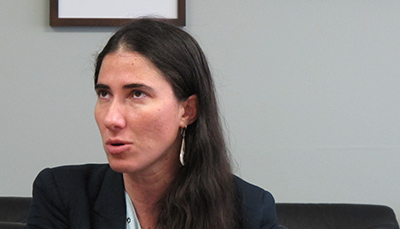Having broken through one long-standing barrier, Yoani Sánchez, the pioneering figure in Cuba’s independent blogosphere, is looking to smash another. “It seemed like an impossible dream, but here I am,” Sánchez told a gathering today at CPJ’s New York offices. After being denied travel authorization at least 20 times in the past, Sánchez is in the midst of her first trip abroad in a decade. And now, Sánchez said, she plans to launch a new publication upon her return to the island nation. Though the project is still in conception, she hopes the result will be modern and innovative in look and content, carrying everything from comprehensive sports coverage to critical opinion columns.
If she succeeds, it will be another landmark for the writer behind Generation Y. That blog, which revolutionized the Cuban information landscape when it debuted in 2007 by offering critical analysis and reporting, is still mostly inaccessible for the average Cuban. Cuba has very few private Internet connections, state-run Internet cafés are highly censored, and hotel connections are prohibitively expensive for most citizens. The launch of a new, broad-based news publication, especially if it were one that could be widely read in Cuba, would have significant implications for press freedom. After all, all authorized domestic news media in Cuba are controlled by the Communist Party, which recognizes freedom of the press only “in accordance with the goals of the socialist society.”
The trip is Sanchez’s first opportunity to take advantage of a reform, announced by the government last year, which eliminated exit visa regulations that had long restricted Cubans’ travel. While the loosening of travel restrictions represented an important advance, Sánchez said, she was quick to emphasize that the country remains the most restrictive in the hemisphere for press freedom. Cuba placed ninth on CPJ’s 2012 global survey of most censored countries, and authorities continued to stifle dissent. After a one-year absence from CPJ’s annual survey of imprisoned journalists, the nation rejoined the ranks of countries jailing journalists in 2012 with the imprisonment of Calixto Ramón Martínez Arias. He is currently on a hunger strike to protest his detention.
Sánchez’s high international profile has made her a frequent target of the authorities. Her international tour has been consistently interrupted by protesters supporting the Cuban government. While she doesn’t expect physical aggression or imprisonment upon her return, she does anticipate a “media firing squad” by the well-oiled Cuban propaganda machine. Sánchez accepted the prospect with a certain amount of nonchalance: “One shouldn’t get accustomed to horror, but I am.” Yet she was optimistic in the long term, saying that the government continues to use “20th-century tactics” that are destined to fail, and that authorities haven’t realized that “the world has changed.”
The wave of support Sánchez has received abroad gives her hope. She told the assembled guests that while it is extremely difficult to access the Internet and receive unfiltered information, Cubans have become savvy and creative out of necessity. The work of international human rights groups eventually reaches them, she said, and is an important source of support for the dissident and independent journalism community.
Also attending the breakfast was Cuban blogger Orlando Luis Pardo Lazo, who said that he “doesn’t want to be an exception–I hope all Cubans will be able to leave” if they wish. The Cubans were also joined by the American and Canadian women who translate and operate Sánchez’s blog, which, like all of the independent Cuban blogs, is hosted on a server overseas. It was the first time they had ever met in person.
Life in Cuba and the way information is shared these days is “peculiar” and full of contradictions, Sánchez said, as she described being on a dilapidated bus in Havana and seeing someone whip out an iPhone 4. While progress on political and economic reforms is far from certain, she said the moment is right for Cubans to push the envelope on all fronts. “If we wait for change to come from above, we are going to get very frustrated.”
